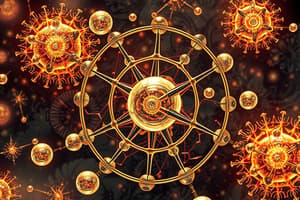Podcast
Questions and Answers
What particles are found in the nucleus of an atom?
What particles are found in the nucleus of an atom?
Identify the correct classification of potassium and chlorine.
Identify the correct classification of potassium and chlorine.
What is the empirical formula of the ionic compound formed from aluminum and sulfur?
What is the empirical formula of the ionic compound formed from aluminum and sulfur?
What is the correct name for the compound SrO?
What is the correct name for the compound SrO?
Signup and view all the answers
What is the name of the compound PCl3?
What is the name of the compound PCl3?
Signup and view all the answers
Which formula represents ammonium carbonate?
Which formula represents ammonium carbonate?
Signup and view all the answers
Which subatomic particle is the smallest and lightest?
Which subatomic particle is the smallest and lightest?
Signup and view all the answers
In an atom of 18Ar, how many electrons, protons, and neutrons are present?
In an atom of 18Ar, how many electrons, protons, and neutrons are present?
Signup and view all the answers
Isotopes are defined as atoms that have the same number of _______ but differing number of _______.
Isotopes are defined as atoms that have the same number of _______ but differing number of _______.
Signup and view all the answers
Which element has the largest first ionization energy?
Which element has the largest first ionization energy?
Signup and view all the answers
Which of the following has the largest second ionization energy?
Which of the following has the largest second ionization energy?
Signup and view all the answers
Which equation correctly represents the first ionization of aluminum?
Which equation correctly represents the first ionization of aluminum?
Signup and view all the answers
Which ion has the largest radius?
Which ion has the largest radius?
Signup and view all the answers
Of the following elements, which has the greatest electronegativity?
Of the following elements, which has the greatest electronegativity?
Signup and view all the answers
Which list indicates the correct order of metallic character?
Which list indicates the correct order of metallic character?
Signup and view all the answers
Based on the octet rule, strontium most likely forms which type of ion?
Based on the octet rule, strontium most likely forms which type of ion?
Signup and view all the answers
How many unpaired electrons are there in the Lewis structure of a nitrogen atom?
How many unpaired electrons are there in the Lewis structure of a nitrogen atom?
Signup and view all the answers
Which of the following would need to lose one electron to achieve a noble gas electron configuration?
Which of the following would need to lose one electron to achieve a noble gas electron configuration?
Signup and view all the answers
The Lewis structure of H2O shows how many nonbonding electron pair(s) on oxygen?
The Lewis structure of H2O shows how many nonbonding electron pair(s) on oxygen?
Signup and view all the answers
Which compound is chromium(III) oxide?
Which compound is chromium(III) oxide?
Signup and view all the answers
What is the frequency of electromagnetic radiation with a wavelength of 0.53 m?
What is the frequency of electromagnetic radiation with a wavelength of 0.53 m?
Signup and view all the answers
Which pair of elements is most apt to form a molecular compound?
Which pair of elements is most apt to form a molecular compound?
Signup and view all the answers
Which type of radiation has the shortest wavelength?
Which type of radiation has the shortest wavelength?
Signup and view all the answers
What is the energy of a photon with a wavelength of 12.3 nm?
What is the energy of a photon with a wavelength of 12.3 nm?
Signup and view all the answers
How many quantum numbers are necessary to designate a particular electron in an atom?
How many quantum numbers are necessary to designate a particular electron in an atom?
Signup and view all the answers
There are how many unpaired electrons in a ground state phosphorus atom?
There are how many unpaired electrons in a ground state phosphorus atom?
Signup and view all the answers
The lowest energy shell that contains f orbitals has what principal quantum number?
The lowest energy shell that contains f orbitals has what principal quantum number?
Signup and view all the answers
Which of the following quantum numbers set is not acceptable for an electron?
Which of the following quantum numbers set is not acceptable for an electron?
Signup and view all the answers
What is the ground state electron configuration for zinc (Zn)?
What is the ground state electron configuration for zinc (Zn)?
Signup and view all the answers
Which set of three quantum numbers (n, l, ml) corresponds to a 3d orbital?
Which set of three quantum numbers (n, l, ml) corresponds to a 3d orbital?
Signup and view all the answers
At maximum, an s-subshell can hold __________ electrons, a p-subshell can hold __________ electrons, and a d-subshell can hold __________ electrons.
At maximum, an s-subshell can hold __________ electrons, a p-subshell can hold __________ electrons, and a d-subshell can hold __________ electrons.
Signup and view all the answers
Elements in the modern version of the periodic table are arranged in order of increasing _______.
Elements in the modern version of the periodic table are arranged in order of increasing _______.
Signup and view all the answers
Which of the following gives the correct order for atomic radius for Mg, Na, P, Si, and Ar?
Which of the following gives the correct order for atomic radius for Mg, Na, P, Si, and Ar?
Signup and view all the answers
The atomic radius of main-group elements generally increases down a group because __________.
The atomic radius of main-group elements generally increases down a group because __________.
Signup and view all the answers
Which one of the following atoms has the largest radius?
Which one of the following atoms has the largest radius?
Signup and view all the answers
Which one of the following has the smallest radius?
Which one of the following has the smallest radius?
Signup and view all the answers
Which of the following is an isoelectronic series?
Which of the following is an isoelectronic series?
Signup and view all the answers
Which of the following correctly lists the atoms in order of increasing size (smallest to largest)?
Which of the following correctly lists the atoms in order of increasing size (smallest to largest)?
Signup and view all the answers
Study Notes
Atomic Structure and Composition
- Atoms contain protons, neutrons, and electrons
- Protons and neutrons are located in the nucleus
- Electrons orbit the nucleus
Identifying Elements
- Potassium is a metal
- Chlorine is a nonmetal
- Aluminum and Sulfur combine to form Al₂S₃
Chemical Formulas and Names
- SrO is called strontium oxide
- PCl₃ is phosphorous trichloride
- Ammonium carbonate's formula is (NH₄)₂CO₃
Subatomic Particles
- Electrons are the smallest and lightest subatomic particles
Isotopes
- Isotopes have the same number of protons but different numbers of neutrons
Atomic Mass
- The average atomic mass of silicon (Si) is 28.1 amu
Periodic Trends
- Elements in the same group exhibit similar chemical properties
Chemical Bonding
- Ionic compounds form from the transfer of electrons between atoms
Quantum Numbers
- Quantum numbers (n, l, ml, ms) describe the properties of electrons in an atom
Electron Configurations
- The electron configuration of nitrogen is 1s²2s²2p³
- The electron configuration of zinc (Zn) is [Ar] 4s²3d¹⁰
- The electron configuration of Nickel is [Ar] 4s²3d⁸
Atomic Structure
- Orbitals are regions of space where electrons are likely to be found
Radioactivity
- Radioactivity is the spontaneous emission of energy in the form of radiation by some atomic nuclei
Periodic Table Arrangement
- Elements on the periodic table are arranged by increasing atomic number
Predicting Ionic Compounds
- Empirical formulas predict the simplest ratio of ions in an ionic compound
Electromagnetic Radiation
- Wavelength and frequency are inversely related
Subatomic Particles: Protons, Neutrons, and Electrons
- Atoms contain protons, neutrons, and electrons
- Protons: Positively charged particles. Neutrons: Neutral. Electrons: Negatively charged particles found outside the nucleus.
Studying That Suits You
Use AI to generate personalized quizzes and flashcards to suit your learning preferences.
Related Documents
Description
Test your knowledge on atomic structure, chemical bonding, and periodic trends. This quiz covers essential topics such as subatomic particles, isotopes, and chemical formulas. Challenge yourself with questions related to the composition and properties of elements.




